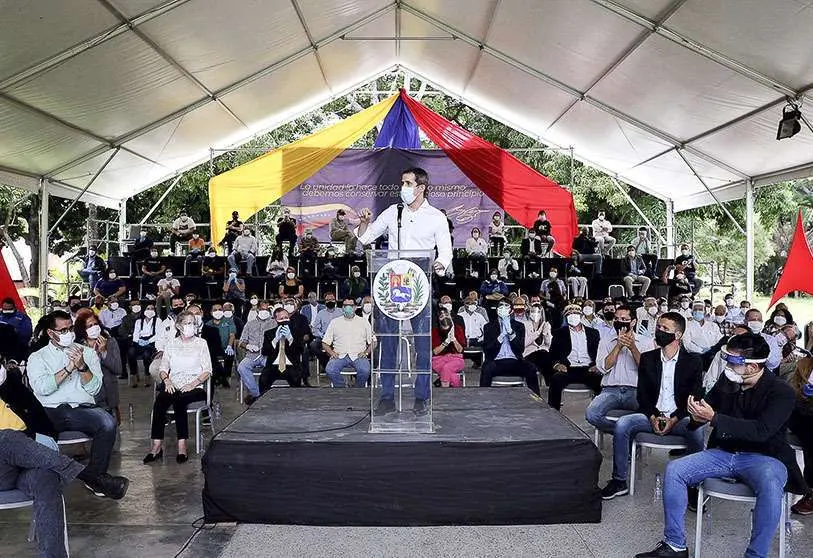The Venezuelan opposition, “déjà vu” year 2005

As if it were a bad dream, Venezuela looks back and feels that the calendar stopped on that December 4, 2005, when the opposition decided not to stand in the legislative elections. 15 years have passed and history repeats itself. Again, the chavismo will make plenary session. “Deja vu”.
Unless there is an unexpected and surprising turn in Venezuelan politics in the next 3 months, the die is cast, as happened in the parliamentary elections 15 years ago, after the opposition parties decided not to go to vote for reasons that, for the most part, are repeated in 2020.
Just 6 days before the 2005 election day, the Democratic Action party (AD) made the decision to withdraw from the race for not trusting the National Electoral Council (CNE) and not having sufficient guarantees to exercise the vote in a secret, as contemplated in the Constitution.
Immediately, the Independent Political Electoral Organization Committee (Copei), which had received the CNE’s rejection of its request to postpone the elections, joined in the withdrawal, which was seconded by Primero Justicia (PJ).
The domino effect was imposed and also dragged the Project Venezuela (PRVZL) formation – created from a split from Copei-, which became one of the most important opposition parties in the Caribbean country.
PRVZL, which used the same reasons as the rest of the opponents, added the aggravating factor of “fraud speculation”, a term that in the middle of 2020 is used in opposition circles constantly, from the day the electoral call was made official.
Three decades ago, out of a total of 5,516 candidatures initially presented, adding titular candidates and alternates, 558 withdrew, all of them from the hard wing of the opposition, which gave the absolute and indisputable triumph to the ruling party with all seats.
The V Republic Movement-Electoral Winners Unit (MVR-UVE) and Change Bloc coalitions won the 167 seats that made up the National Assembly and will be increased by 110 in the next legislature, becoming, for the first time, by 277 deputies, by decision of the CNE.
And history repeats itself. The success or error of putting Parliament in the hands of the ruling party without contesting it in the race is again on the table. The 2005 strategy, aimed at putting pressure on Chavismo, did not work. Will there be a stumble on the same stone or is there an ace up his sleeve to remedy it? The unknown will be cleared up in just three months.
Just as then-president Hugo Chávez (1999-2013) did, today Nicolás Maduro criticizes the decision of the opposition bloc led by Juan Guaidó for his decision not to attend the next elections.
But Guaidó not only receives criticism from the ruling party, but also from opposition political actors, among which the two-time candidate for the Presidency and leader of Primero Justicia, Henrique Capriles, stands out, who considers the decision to abstain from participating as a serious mistake.
Capriles is clear about it: “if he leaves a little crack, we have to put our hand in that little crack and then put our foot in, so that the door doesn’t close. No one would have imagined that they were going to be imprisoned, perhaps there is a little crack.”
And that gap that the PJ leader sees is in the elections, an opportunity to “continue fighting” for change in Venezuela that should not be missed.

“The fight is fighting, not tweeting,” Capriles said last week during a virtual speech directed at citizens, which left no one indifferent, and in which he made it clear that he does not admit that his rivals within the opposition of say “how to think”.
And while Guaidó does not move his position one iota, directed -according to his detractors- by the United States Government, his opposition rival in the contest advances in his proposals, despite not being able to participate in them in the front line of fire because he is unable to participate active political activity.
The public disputes in the opposition give wings to Chavismo, which, without much effort, is heading to repeat the results of the 2005 elections, thus replicating a history of successes or errors.
The pre-elections of the 2015 legislative elections were not without controversy either, but on that occasion, the opposition was able to gain political gain and managed to capitalize on a situation that, 5 years later, it seems to have lost control.
On that occasion, the debate was opened by the delay of the CNE, according to the opposition, in making public the date for the holding of the elections and the start of the nominations and registrations of candidates.
At the insistence, Maduro pointed out that “extremist sectors are trying to pressure the CNE to announce the date of the parliamentarians” and recalled that “it is up to the Electoral Power to decide, as the Constitution indicates, when the date is, without pressure from no type”.
The opponents called for demonstrations in different cities of the country so that the day set for election day would be announced immediately and, even, the leader of Popular Will Leopoldo López, who was in prison, began a hunger strike as a measure pressure.
The then president of the CNE, Tibisay Lucena, rejected “the campaign by some political groups that seek to impose their will” and stated that some organizations whose interests are not electoral in nature “have developed a whole campaign to discredit the institution and the generation of political tension in the country, around speculation, manipulation and lies “. Finally, on June 22, 2015, the date for the elections was set: December 6.
Once this obstacle was overcome, others arose and the opposition developed its campaign between protests and discontent over the management of the Executive and the CNE, but, despite everything, it participated in the elections. And won. However, at this moment, the memory of 2005 weighs more, more present than ever. History repeats itself. “Deja vu”.








